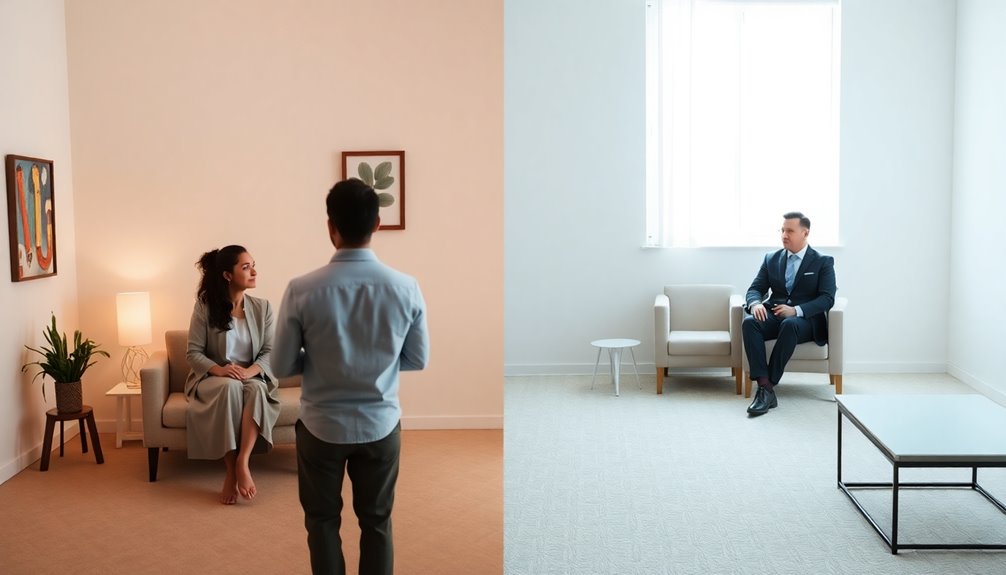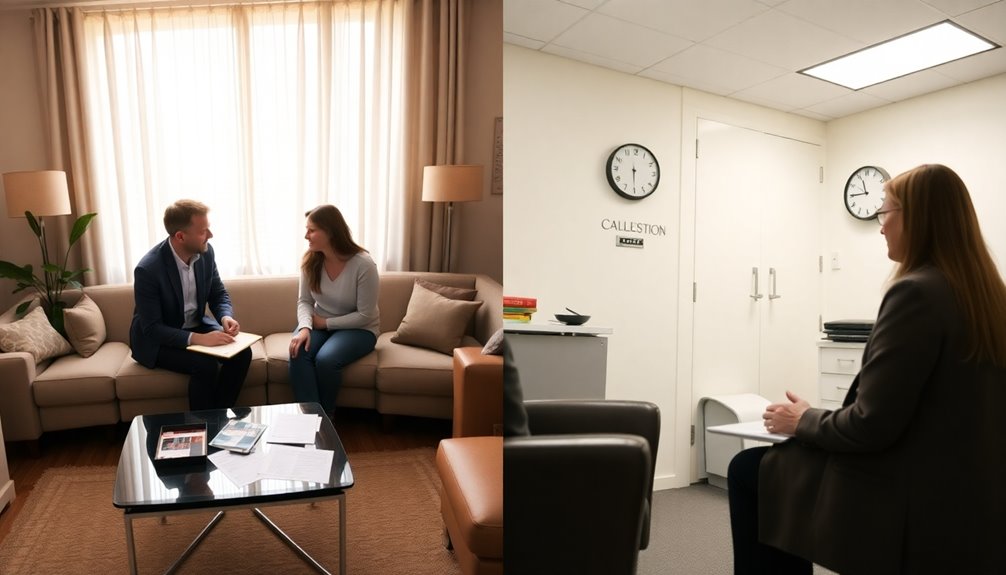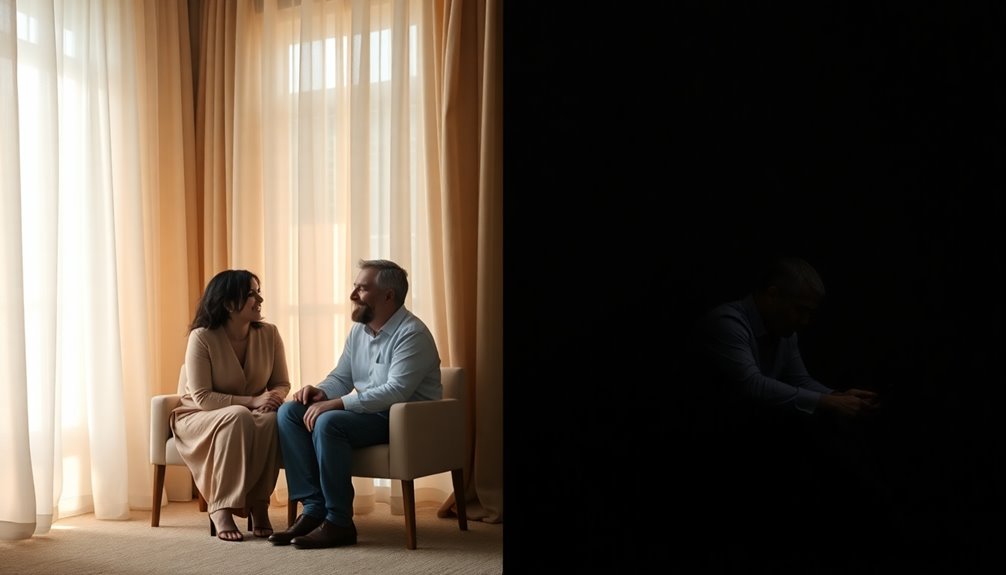When it comes to saving your relationship, marriage coaching and counseling each bring unique benefits. Coaching focuses on immediate improvement, tackling communication, and conflict resolution in a few sessions. Couples often experience significant increases in satisfaction and commitment during coaching. On the other hand, counseling delves into emotional healing, addressing past traumas, and exploring deeper psychological issues. While it can lead to long-term changes, it usually takes more time. The choice between coaching and counseling depends on your specific needs and goals. Understanding these differences can guide you toward the best option for your relationship journey.
Key Takeaways
- Marriage coaching focuses on communication and actionable strategies, providing quick results and higher satisfaction improvement rates compared to counseling.
- Counseling delves into past traumas and emotional issues, offering deeper healing and understanding but typically takes longer to achieve results.
- Couples seeking immediate solutions and skill-building may benefit more from coaching, while those needing emotional processing might prefer counseling.
- Both approaches have high success rates, but coaching has shown a 100% improvement in satisfaction among couples who commit to the process.
- Assessing your relationship needs and desired outcomes can guide your choice between coaching and counseling for effective support.
Understanding Coaching and Counseling

When navigating the complexities of relationships, understanding the differences between marriage coaching and counseling can be crucial.
Marriage coaching focuses on improving communication, enhancing emotional connections, and promoting conflict resolution. You'll learn to express your feelings effectively and listen actively, which statistically boosts relationship satisfaction by 87%. Coaches guide you in rekindling trust and vulnerability, transforming conflicts into growth opportunities. Additionally, coaching provides conflict resolution strategies that help couples collaborate effectively on finding solutions.
In contrast, marriage counseling aims to address root causes of issues, often exploring past traumas and emotional pain. This therapeutic approach works through personal obstacles to achieve clarity and healing.
While coaching emphasizes proactive growth and accountability, counseling delves into understanding and resolving deeper emotional struggles. Knowing these distinctions can help you choose the support that best fits your needs.
Key Differences in Focus

Understanding the key differences in focus between marriage coaching and counseling can significantly impact your relationship's progress.
Counseling often dives into your past, helping you understand previous traumas and emotional struggles to foster healing in the present. It may involve unpacking deep-rooted issues, but it can take a broader approach to emotional processing.
In contrast, coaching is all about the present and future, concentrating on your specific goals and how to achieve them. You'll work on actionable plans, emphasizing quick results and continuous improvement. Coaching typically involves 8-10 sessions to facilitate effective change and empower couples to discover personalized solutions.
While counseling may last several months or years, coaching typically involves fewer sessions but with a more intense focus on immediate growth and development in your relationship.
Roles and Expertise of Professionals

While both marriage counselors and coaches play vital roles in supporting couples, their expertise and approaches differ significantly.
Counselors provide an objective perspective, offering unbiased insights and evidence-based techniques for growth. They excel in facilitating communication, ensuring both partners feel heard, and teaching conflict resolution strategies. Their focus is on emotional support and creating a safe space for expression. In contrast, marriage coaching aims to strengthen and improve couple relationships by helping them navigate challenges and resolve conflicts.
On the other hand, coaches adopt a solution-focused approach, emphasizing goal-setting and proactive strategies for nurturing intimacy. They teach active listening and help couples develop action plans to tackle specific issues.
Coaches encourage accountability and self-improvement, guiding couples to redirect negative behaviors and express emotions constructively. Each professional brings unique strengths to the table, catering to different needs in your relationship.
Session Structure and Costs

Both marriage coaching and counseling offer structured approaches to help couples improve their relationships, but they differ in session format and costs.
In coaching, sessions focus on specific skills or issues, often incorporating practice time for both partners. These meetings can be held virtually and usually occur biweekly, allowing for targeted tasks and discussions.
In contrast, counseling sessions typically last around 50 minutes and involve deep discussions about ongoing issues, guided by a therapist. This format often utilizes various therapeutic techniques, such as client-centered therapy, to enhance communication and understanding.
When it comes to costs, coaching is generally more affordable, often under $30 per hour, and may include extra resources.
Counseling, however, can range from $75 to $150 per session, accumulating significantly over time, especially without insurance coverage for many couples.
Goals and Desired Outcomes

Setting clear goals is essential for couples seeking to enhance their relationships, whether through marriage coaching or counseling.
In counseling, you'll focus on improving communication, rebuilding trust, resolving past conflicts, and achieving mutual growth. These goals aim to foster a deeper connection and enhance overall relationship satisfaction. A successful counseling process often requires participation and commitment from both partners, as this helps to address common challenges that arise in relationships.
On the other hand, marriage coaching emphasizes the present and future, guiding you to set specific, forward-looking goals. You'll work on enhancing intimacy and mastering conflict resolution skills, all while striving to achieve shared aspirations.
Both approaches aim to create a more fulfilling relationship, but the focus differs slightly. By defining your desired outcomes, you can choose the path that best aligns with your relationship needs.
Effectiveness and Success Rates

Understanding the effectiveness and success rates of marriage coaching and counseling can help you make an informed decision about which approach suits your needs.
Marriage coaching shows impressive results, with couples rating their satisfaction at an average of 3.8 before coaching and 7.6 afterward, marking a 100% improvement. About 89% of those considering divorce choose to stay together after coaching, indicating that coaching serves as a deterrent against marital dissolution.
On the other hand, counseling offers a 70% improvement rate, with 93% of couples feeling they gain essential tools for their relationship.
Both methods emphasize open communication, commitment, and the application of learned skills.
Ultimately, your choice may depend on personal preferences for how you want to tackle relationship challenges and achieve lasting satisfaction.
Choosing the Right Option

How do you decide between marriage coaching and counseling? Start by considering your needs. If you're focused on present challenges and future goals, coaching might be the right fit for you. It offers a partnership approach, emphasizing solutions and personal growth with fewer sessions.
On the other hand, if you need to address past issues and emotional conflicts, counseling provides a therapeutic framework that explores these deeper concerns. Counselors focus on identifying root causes of marital strife, which can be essential for healing.
Also, think about qualifications. Counselors are licensed professionals trained in therapeutic strategies, while coaches may not have formal licensure but bring practical experience.
Lastly, weigh costs and accessibility. Coaching is generally more affordable and flexible, while counseling may be covered by insurance.
Choose the option that aligns best with your relationship's needs.
Frequently Asked Questions
Can Coaching Help With Immediate Relationship Issues?
Absolutely, coaching can help with immediate relationship issues.
It provides prompt assistance during crises like infidelity or serious conflicts. You'll work on stabilizing your situation, developing short-term action plans, and improving communication skills.
Coaches focus on enhancing emotional intimacy and understanding your partner's needs. By addressing conflicts constructively, you'll create healthier interactions and build emotional resilience, helping you navigate the challenges and reconnect with your partner more deeply.
How Do I Know if I Need Coaching or Counseling?
To determine if you need coaching or counseling, assess your relationship challenges.
If you're facing minor communication issues and seek practical solutions, coaching might be the right fit.
However, if you're dealing with deep-rooted problems or past traumas, counseling is likely necessary.
Consider your goals: are you looking for immediate strategies or exploring past emotions?
Your commitment and willingness to engage in the process also play a crucial role in making this decision.
Is There a Specific Type of Couple for Coaching?
Yes, there's a specific type of couple suited for coaching.
If you and your partner face common issues like communication gaps or conflict resolution, and you're committed to improving your relationship, coaching might be right for you.
You should also be open to feedback and willing to work collaboratively toward shared goals.
If you're not dealing with severe mental health issues or past traumas, coaching can provide a constructive, future-focused approach.
What Happens if Coaching Doesn't Work for Us?
If coaching doesn't work for you, it might be due to a lack of commitment from one or both partners.
You may find that underlying issues, like trauma or addiction, aren't being addressed adequately.
Ineffective coaching methods could also hinder progress, especially if the coach doesn't understand your specific needs.
In crisis situations, coaching mightn't provide the immediate support you need, prompting a reevaluation of your approach to relationship challenges.
How Do I Select a Qualified Marriage Coach?
To select a qualified marriage coach, start by checking their credentials and training.
Look for certifications from recognized organizations and experience with couples facing similar issues.
Review client testimonials and success rates to gauge their effectiveness.
Ensure their coaching approach is solution-focused and encourages your participation.
Finally, understand the session structure, costs, and scheduling flexibility to fit your needs.
This way, you'll find a coach who aligns with your goals.
Conclusion
In the end, choosing between marriage coaching and counseling depends on your unique needs. If you're looking for guidance to strengthen your relationship and set future goals, coaching might be the way to go. However, if you're facing deep-rooted issues that require healing, counseling could be more beneficial. Take the time to assess your situation, consider your goals, and select the option that feels right for you. Your relationship deserves the best support possible.








